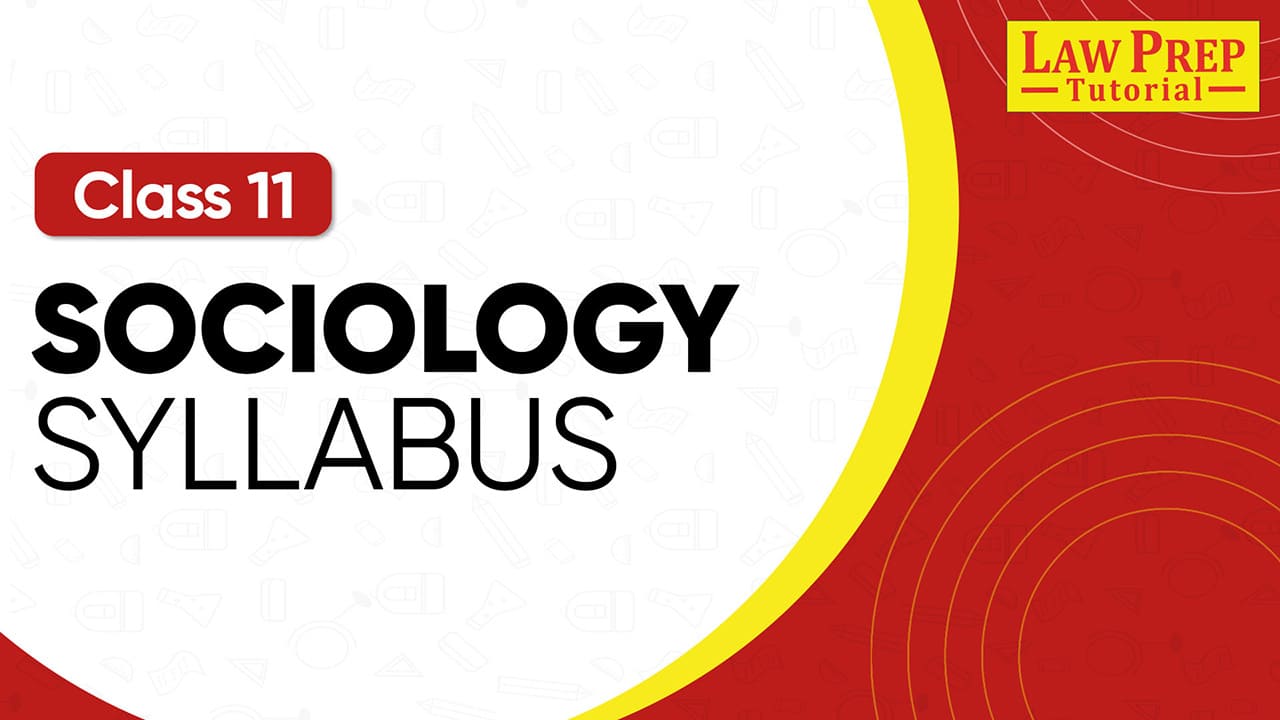The Class 11th Sociology syllabus 2026-27 introduces you to the fascinating study of society, culture, and human relationships. It helps you understand how social institutions, traditions, and changes shape everyday life.
Designed by CBSE, the syllabus of sociology subject for class 11 develops analytical skills, critical thinking, and awareness about Indian and global society. From learning key concepts to exploring social change, the curriculum builds a strong base for higher studies in humanities and social sciences.
Below, we cover the complete Class 11 Sociology syllabus, prescribed books, exam pattern, and preparation tips.
Class 11th Sociology Syllabus 2026-27: Overview
| Part | Units | Marks |
| A. Introducing Sociology | 1. Sociology, Society and its Relationship with other Social Sciences 2. Terms, Concepts and their Use in Sociology 3. Understanding Social Institutions 4. Culture and Socialisation 5. Doing Sociology: Research Methods | 32 |
| B. Understanding Society | 6. Social Structure, Stratification and Social Processes in Society 7. Social Change and Social Order in Rural and Urban Society 8. Environment and Society 9. Introducing Western Sociologists 10. Indian Sociologists | 48 |
| Total (Theory) | 80 Marks | |
| Project Work | 20 Marks | |
| Grand Total | 100 Marks |
📥 Download Class 11 Sociology Syllabus PDF.
For your convenience, we are providing the official CBSE Class 11 Sociology Syllabus PDF 2026-27. You can download it directly and keep it handy for study and revision.
Class 11 Sociology Syllabus 2026-27: Part A
Part A: Introducing Sociology
The first part of the Class 11 Sociology syllabus 2026-27 familiarizes students with the foundational concepts of sociology and how it connects to everyday life. It introduces the subject’s relationship with other social sciences, essential terms and concepts, and the functioning of major social institutions. Students also learn about culture, socialisation, and the methods used in sociological research.
This part lays the groundwork for understanding society systematically, encouraging analytical and critical thinking skills. By studying these units, you will gain the basic knowledge required to explore society’s structure, culture, and dynamics more deeply in higher classes.
| Sr. No. | Unit Name | Topics Covered |
| Unit 1 | Sociology, Society and its Relationship with other Social Sciences | – Emergence of Sociology – Modernity and social change in Europe and the emergence of sociology – Sociology and common sense – Sociology and other social sciences (Anthropology, Psychology, Economics, Political Science, History) |
| Unit 2 | Terms, Concepts and their Use in Sociology | – Social groups, community, association, institution, organization – Role, status, norms and values – Social stratification and social control – Inequality and difference |
| Unit 3 | Understanding Social Institutions | – Family, marriage and kinship – Work and economic life – Political institutions – Religion as a social institution – Education as a social institution |
| Unit 4 | Culture and Socialisation | – Culture: concept and characteristics – Relationship between individual and society – Socialisation and the process of learning – Agencies of socialisation: family, peers, school, media |
| Unit 5 | Doing Sociology: Research Methods | – What is sociological research? – Stages of research process – Quantitative and qualitative methods – Tools and techniques of data collection (survey, interview, observation, questionnaire) |
More Important Resources for CBSE Exam:
| Class 11th Hornbill Syllabus | CBSE Class 11th Commerce Subjects |
| CBSE Full Form | All about CBSE Class 11th |
| Class 11th Syllabus | Class 12th Syllabus |
| Class 11th Commerce Books | CBSE Board: All details |
Class 11 Sociology Syllabus 2026-26: Part B
Part B: Understanding Society
The second part of the Sociology syllabus for class 11th builds upon the basics and takes you deeper into society’s functioning, structures, and processes. It examines social stratification, rural and urban social life, and issues of environment and society.
This part also introduces key sociological thinkers, both Western and Indian, who shaped the discipline with their theories. By studying these units, students gain a broader understanding of how societies evolve, adapt to changes, and address challenges.
It connects classroom learning with real-life contexts, making sociology more meaningful and useful for understanding the contemporary world.
| Sr. No. | Unit Name | Topics Covered |
| Unit 6 | Social Structure, Stratification and Social Processes in Society | – Social structure and social processes – Social stratification: class, caste, tribe, gender – Social processes: cooperation, conflict, competition, accommodation, assimilation |
| Unit 7 | Social Change and Social Order in Rural and Urban Society | – Social change: concept and factors (economic, technological, cultural) – Social order: conformity and deviance – Social control: formal and informal means – Rural and urban differences in social order |
| Unit 8 | Environment and Society | – Relationship between environment and society – Environmental problems and issues – Sustainable development – Social dimensions of environmental issues |
| Unit 9 | Introducing Western Sociologists | – Karl Marx: class and class struggle – Emile Durkheim: division of labour, social facts – Max Weber: bureaucracy, authority, Protestant ethic and spirit of capitalism |
| Unit 10 | Indian Sociologists | – G.S. Ghurye: caste and race – A.R. Desai: state and society – M.N. Srinivas: social change, Sanskritisation, Westernisation – Andre Beteille: inequality and social structure |
Class 11 Sociology Syllabus: Question Paper Design
The Class 11 Sociology exam is designed to test students’ understanding, analytical ability, and application of concepts. The paper includes a variety of question types such as Very Short Answer, Short Answer, and Long Answer questions. Internal choice is provided in many questions.
- Theory Exam: 80 Marks
- Project Work: 20 Marks
- Total: 100 Marks
- Duration: 3 Hours
| Typology of Questions | Objective | Marks | Weightage |
| Remembering & Understanding | Recall facts, terms, concepts, identify, define | 24 | 30% |
| Applying | Use knowledge and facts in new situations, solve simple problems | 24 | 30% |
| Analysing, Evaluating & Creating | Compare, contrast, examine, classify, explain, interpret, judge | 32 | 40% |
| Total | 80 | 100% |
Question Format
- The question paper will include 16–18 questions.
- Internal choice will be provided in long answer type questions.
- The exam ensures a balanced coverage of Part A: Introducing Sociology and Part B: Understanding Society.
Check the latest CBSE Class 11 syllabus for all subjects below:
Prescribed Books for Class 11 Sociology 2026-27
Students of Class 11 Sociology must follow the NCERT textbooks prescribed by CBSE. These books are the primary source for understanding concepts, preparing for exams, and completing project work.
- Introducing Sociology – Class XI (Published by NCERT)
- Understanding Society – Class XI (Published by NCERT)
Both books provide comprehensive coverage of the syllabus, real-life examples, exercises, and case studies to strengthen conceptual clarity. They are essential for board exam preparation and also useful for building a strong foundation in sociology for higher studies.
Objectives of Class 11 Sociology Syllabus 2026-27
- Introduce the discipline of Sociology and show how it differs from and relates to other social sciences.
- Familiarize students with basic concepts and social institutions like family, marriage, education, economy, and politics.
- Develop critical awareness of social processes such as stratification, social change, and control.
- Encourage analytical and research skills through exposure to sociological methods.
- Promote sensitivity towards diversity and inequality in Indian society.
- Help students connect theory with real-life situations, making the subject practical and relatable.
Tips to Prepare for Class 11 Sociology Syllabus 2026-27
1. Read NCERT Textbooks Thoroughly
Stick to the prescribed books Introducing Sociology and Understanding Society. Go through each chapter carefully as most exam questions come directly from NCERT.
2. Make Short Notes of Key Concepts
Write down important terms, definitions, and theories in your own words. This helps in quick revision before exams.
3. Use Real-Life Examples
Relating sociological concepts like caste, class, or urbanization to real situations makes them easier to remember and explain in exams.
4. Practice Previous Year Papers
Solving past question papers gives an idea of exam pattern, marks distribution, and frequently asked topics.
5. Focus on Thinkers and Theories
Pay special attention to Indian and Western sociologists (Marx, Weber, Durkheim, M.N. Srinivas, Ghurye, etc.), as questions are often based on their contributions.
6. Prepare Projects Seriously
The project carries 20 marks. Choose a relevant topic, collect data, and present it neatly. It boosts your overall score.
7. Revise Regularly
Keep revising chapters weekly to strengthen memory and avoid last-minute stress.
Suggested Project Topics for Class 11 Sociology
- Study of family structures in your neighborhood (nuclear, joint, extended).
- Social change in rural areas due to technology or migration.
- Impact of social media on youth behavior and relationships.
- Role of women in household decision-making.
- Study of religious or cultural practices in your community.
- Educational opportunities and challenges faced by underprivileged groups.
- Survey on environmental awareness among students.
- Analysis of urbanization and lifestyle changes in your city/town.
- Exploring the concept of inequality in terms of caste, class, or gender.
- Work culture in local institutions (shops, offices, cooperatives).
Read the chapter-wise summaries of Class 11 English here:
FAQs About Class 11 Sociology Syllabus 2026-27
There are 10 units divided into two parts – Part A (5 units) and Part B (5 units).
Yes, project work is compulsory and it carries 20 marks.
Important topics include social institutions (family, marriage, kinship), socialisation, social change, environment and society, and contributions of Karl Marx, Emile Durkheim, Max Weber, and Indian sociologists like M.N. Srinivas and G.S. Ghurye.
The syllabus includes Karl Marx, Emile Durkheim, and Max Weber.
The Indian sociologists are G.S. Ghurye, A.R. Desai, M.N. Srinivas, and Andre Beteille.
Read NCERT thoroughly, prepare short notes, focus on key concepts and thinkers, practice past papers, and complete the project sincerely.
Sociology is considered a scoring subject if students understand the concepts and use examples in answers. With consistent study, it is easier compared to many other humanities subjects.
Find detailed questions and answers from all chapters of English Class 11 now:
Explore the updated CBSE Class 12 syllabus for all subjects here:
Discover CLAT exam resources that can help you get started early:
Explore CLAT coaching centers across different cities:


